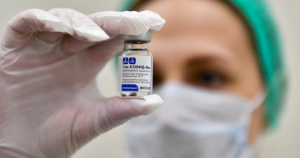
Media investigation of Sputnik V reveals litany of errors

An investigation published Thursday by independent media outlet Meduza (designated a ‘foreign agent’ by the Russian authorities) and The Bell looked in detail at Russia’s coronavirus vaccine, Sputnik V. Throughout vaccine development, pressure to beat international competitors seems to have forced error after error — despite the vaccine itself clearly being effective. Here are some of the key takeaways from the investigation:
- The developer of Sputnik – Moscow’s Gamaleya Center – came up with an effective vaccine only months after the emergence of the coronavirus, but only under laboratory conditions. Russian pharmaceutical companies were forced to work out how to mass produce it at their own expense. “Everyone was in the dark: the vaccine didn’t work, whole batches were disposed of, money went down the drain,” writes Meduza, citing a source at one pharmaceutical company.
- Cross-contamination of the two vaccine doses (Sputnik V is administered in two jabs) turned out to be an unexpectedly serious problem, and production sites for different components had to be strictly separate. Even now, cross-contamination issues have not been completely eradicated — one of the reasons why the World Health Organization (WHO) refused to recognize the vaccine in 2021, according to Meduza.
- Problems also emerged with the second, more complex, Sputnik V dose (unlike the AstraZeneca vaccine, for example, the first and second doses of the Russian drug use different adenovirus vectors). According to Meduza, this problem has not been completely eradicated and cropped up recently during production in India. About 10 million first doses were exported to Argentina last year, but the contract was almost canceled due to a shortage of the second dose.
- A big Sputnik V contract with Brazil was probably lost last year because of problems with the second dose. Meduza reported that, in October, Russia’s Foreign Ministry tried to link the re-opening of flights to Brazil with the country’s recognition of Sputnik.
- Russia was not prepared for the registration procedures at the WHO and the European Medicines Agency (EMA). “It was purely a gamble,” said one individual familiar with Russia’s attempt to register Sputnik V with the EMA. The results from the final stage of Sputnik V’s clinical trials have not yet been released.
- The man appointed to promote and sell the vaccine was Kirill Dmitriev, head of the Russian Direct Investment Fund. Dmitriev has few doubts that Sputnik V will, eventually, be recognized outside of Russia. “When nobody believed us, when everyone said it wasn’t true, when they wrote prejudiced comments which, among other things, undermined confidence in the vaccine in Russia, we suffered for it,” he told Meduza. “[But] we managed to find and invest in the world’s best vaccine.”
Why the world should care: The Sputnik V story is a cautionary tale about how lobbying cannot replace strict observance of procedure. Regardless of Dmitriev’s confidence that Sputnik V will soon be internationally recognized, in reality this is still months away at best.




